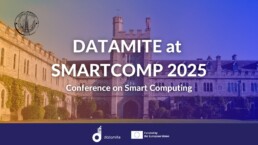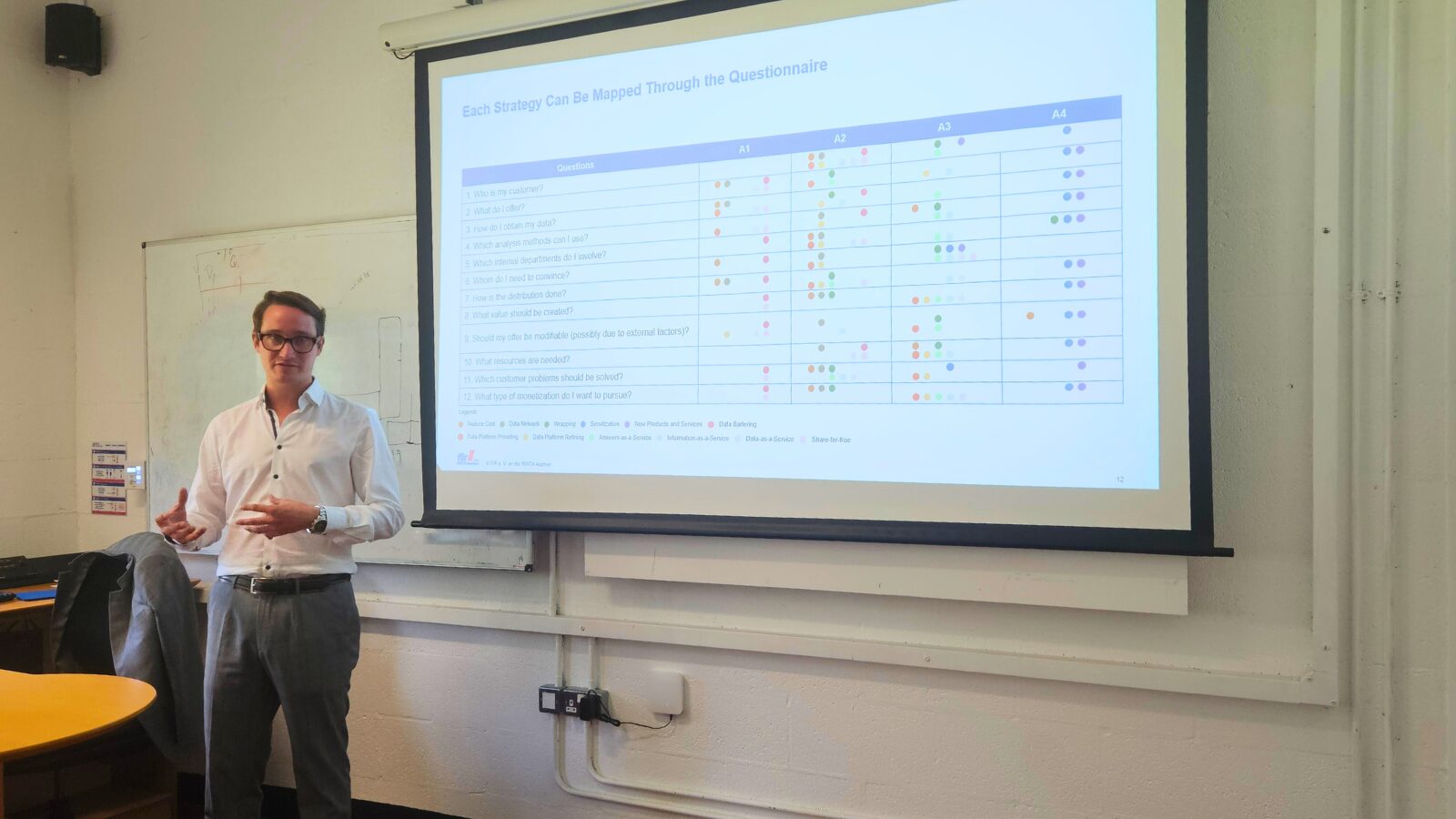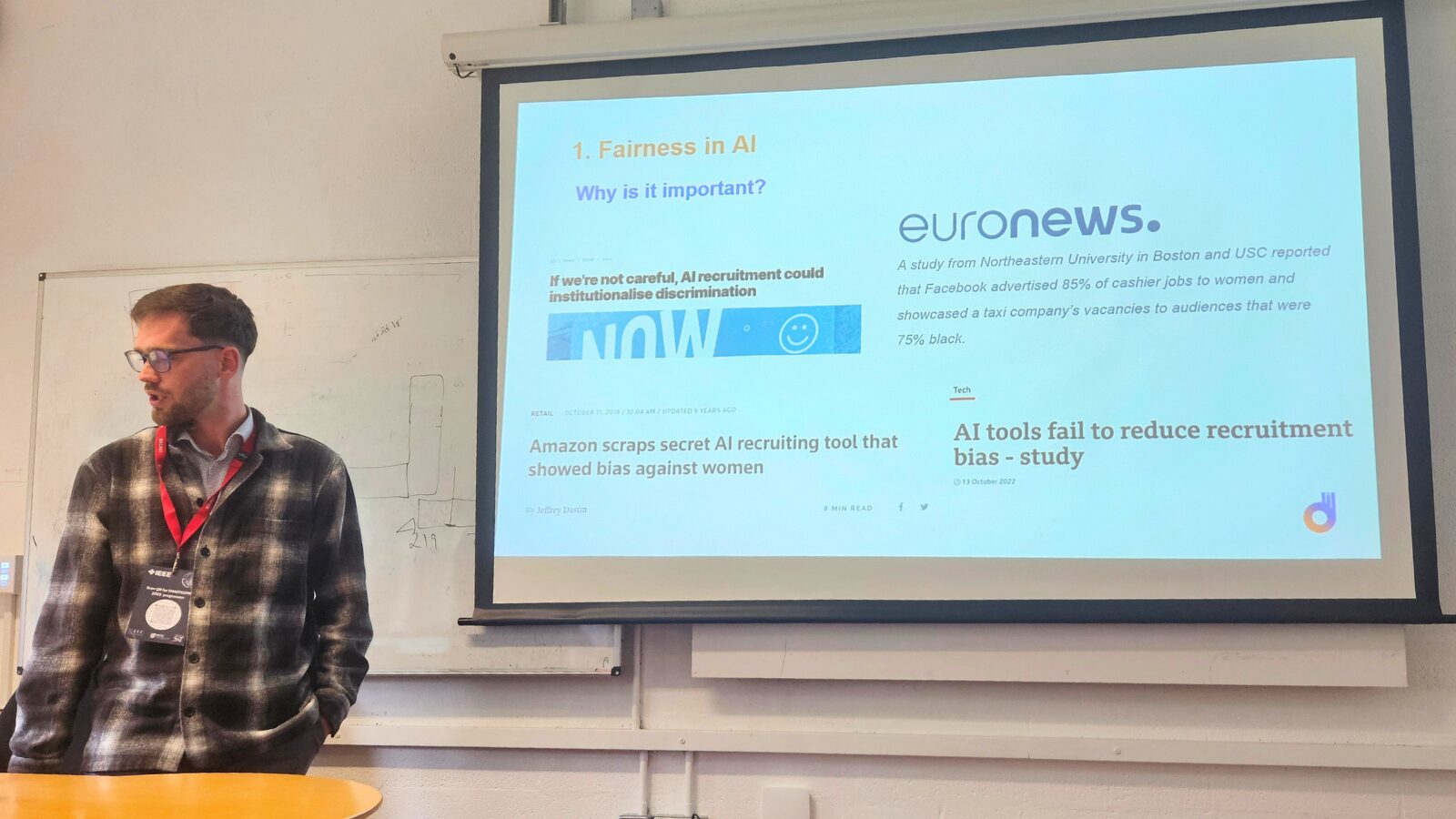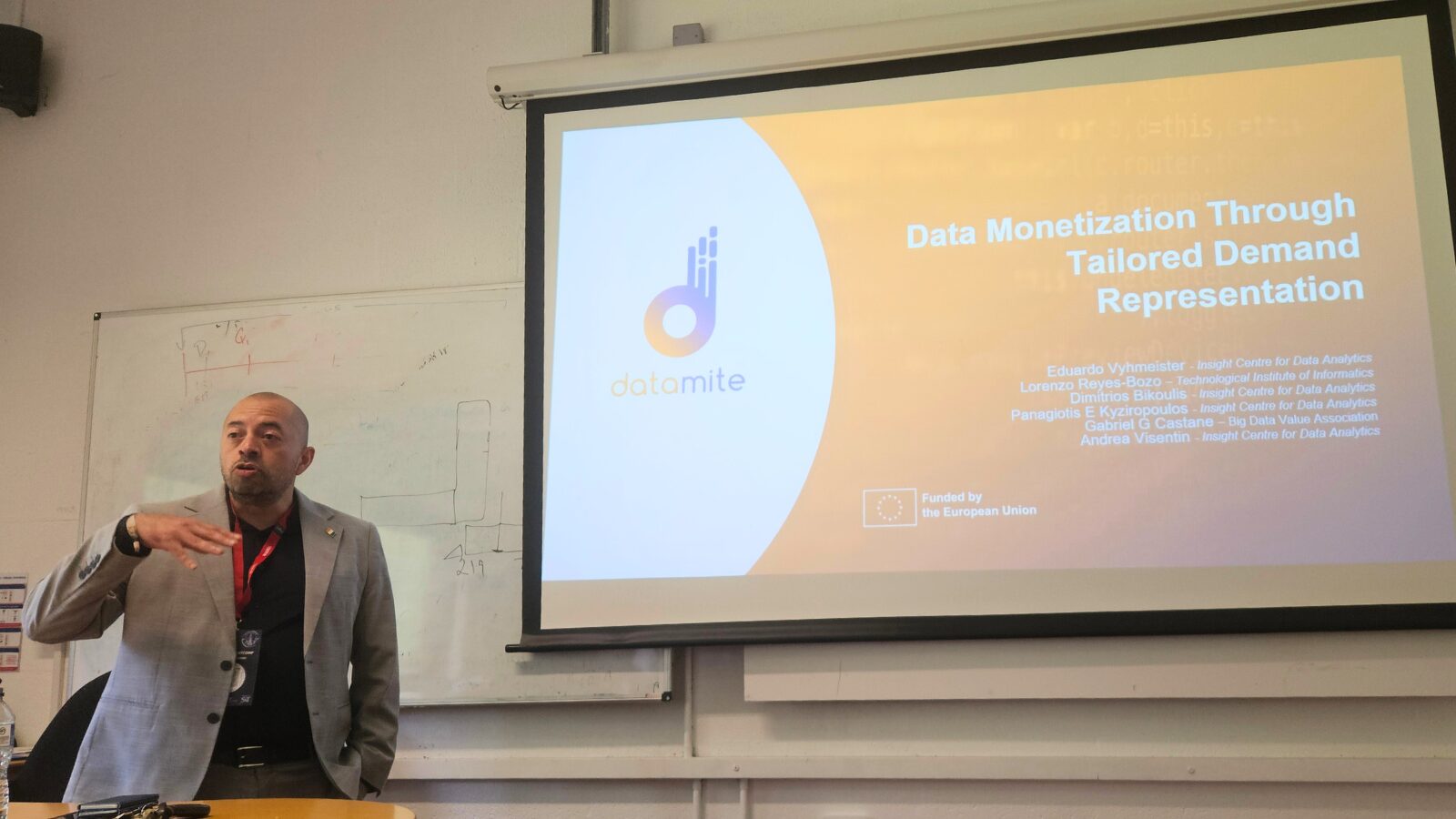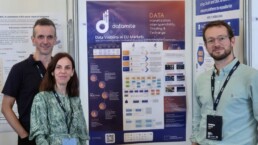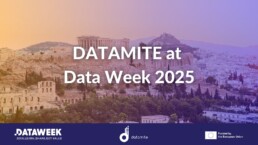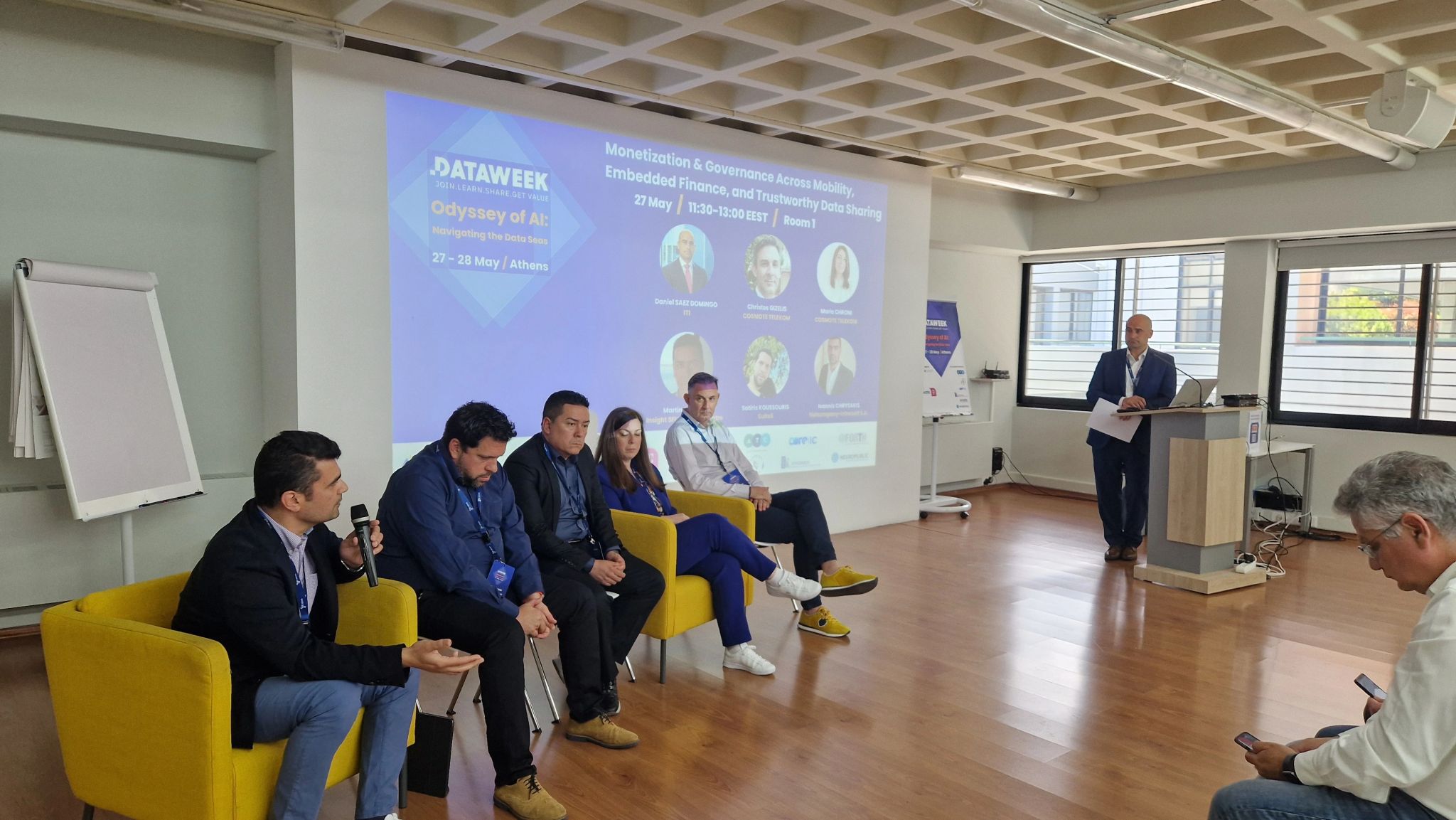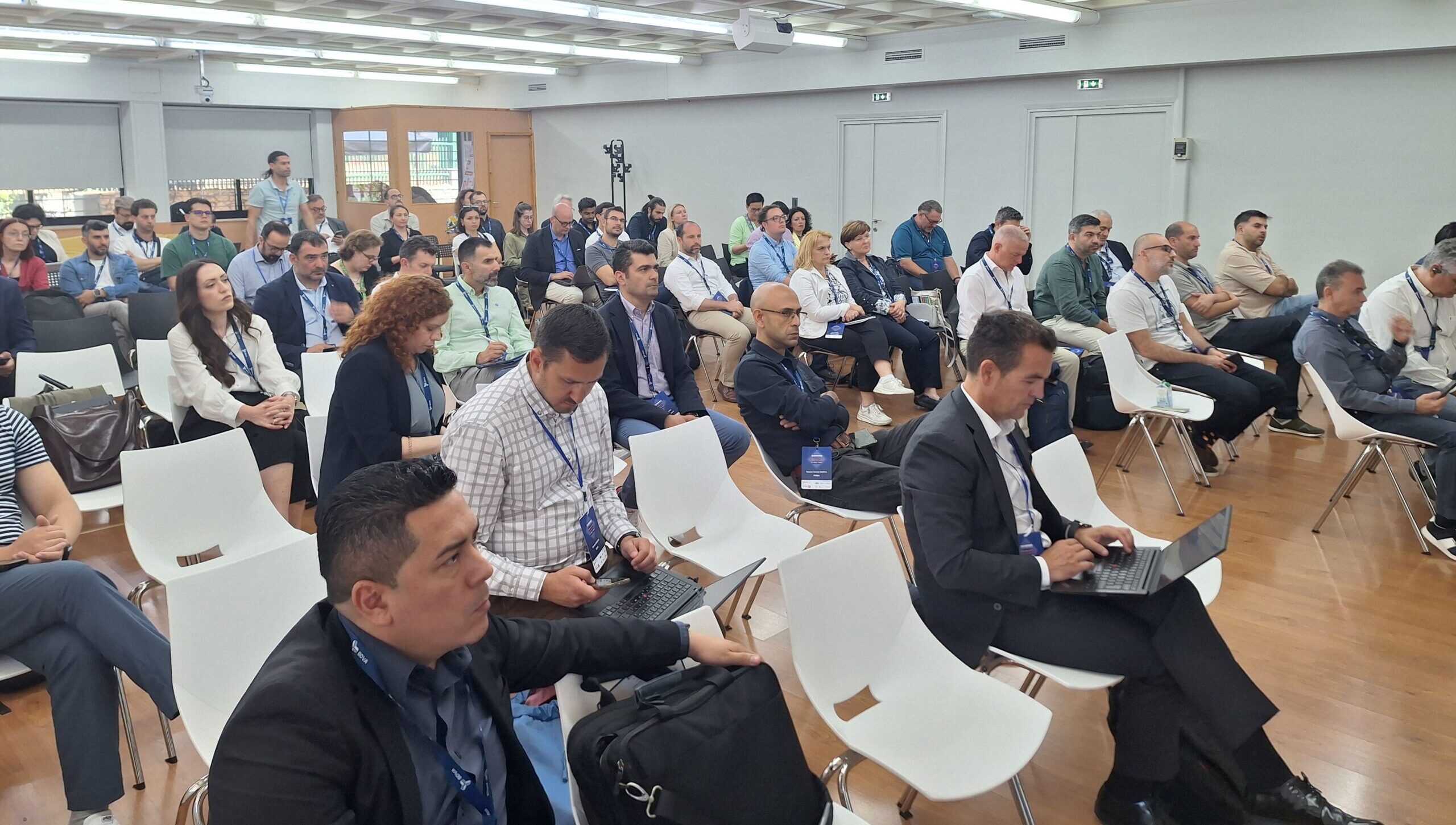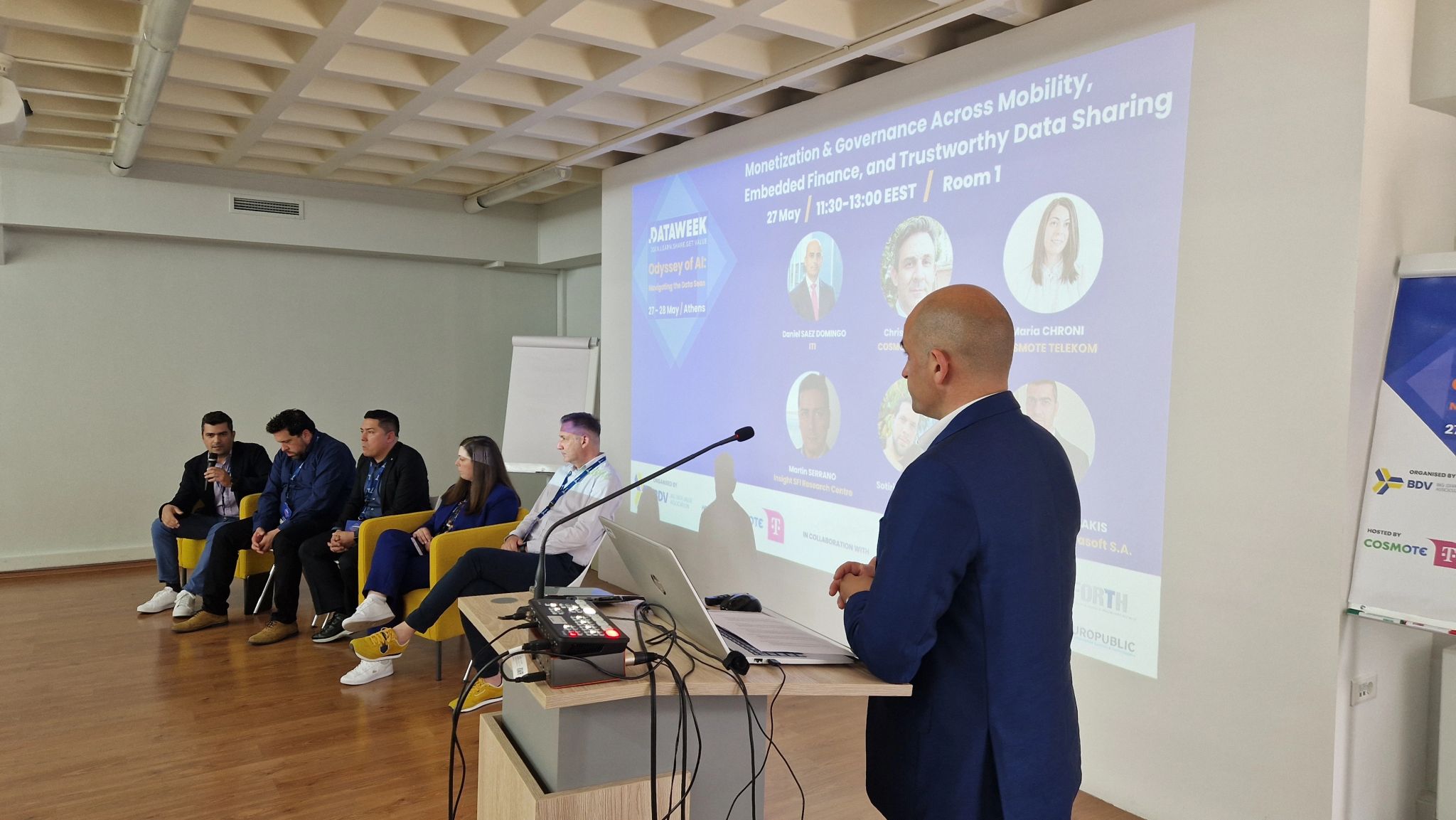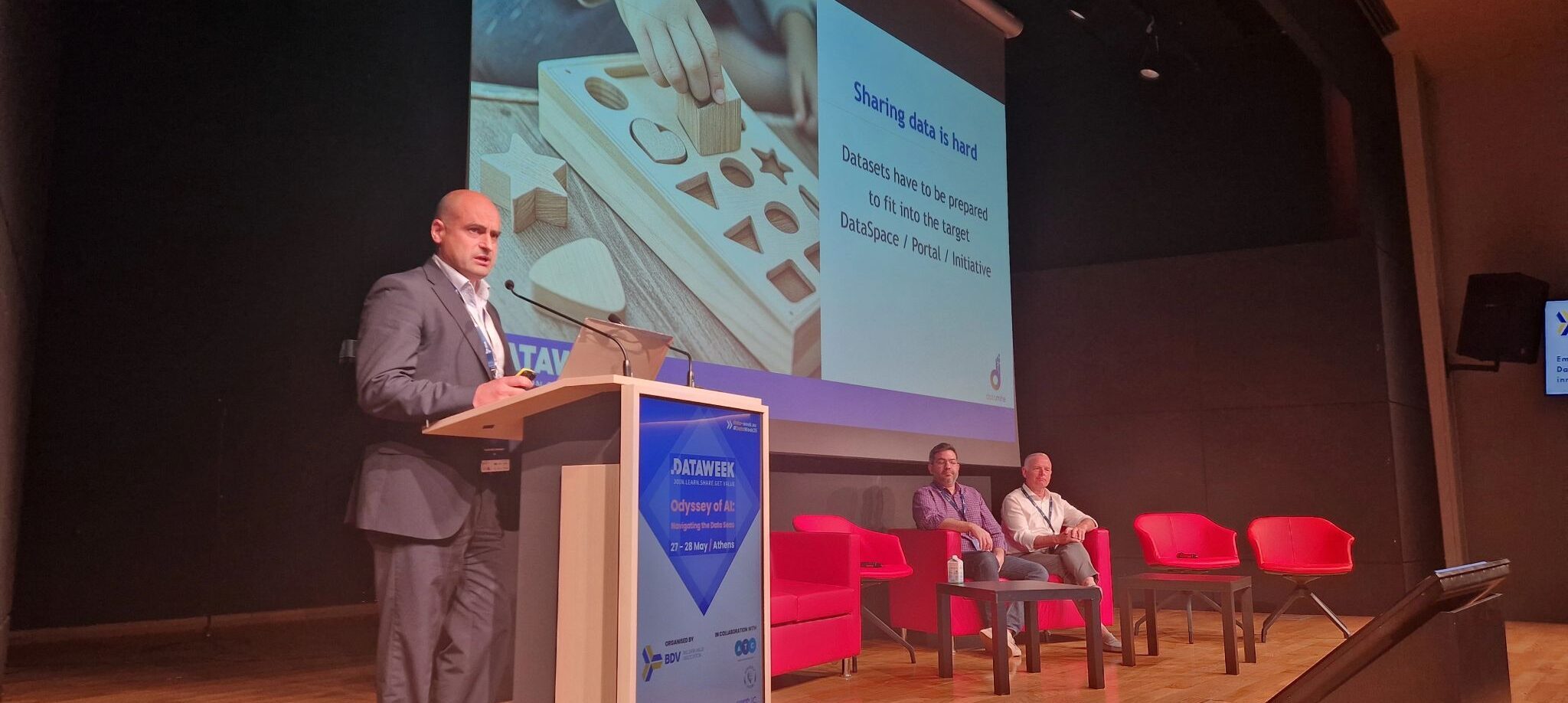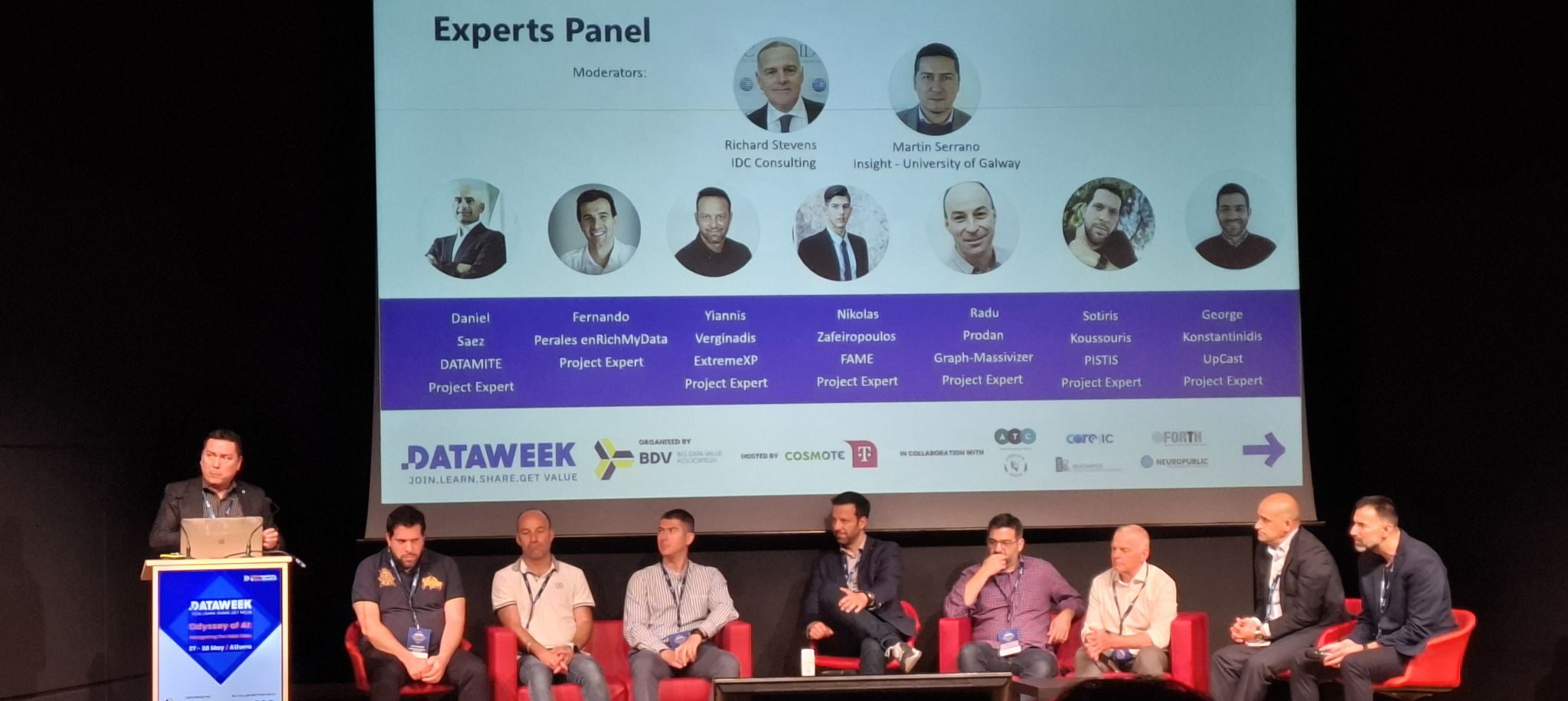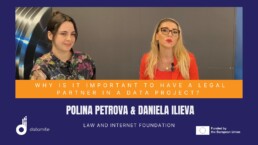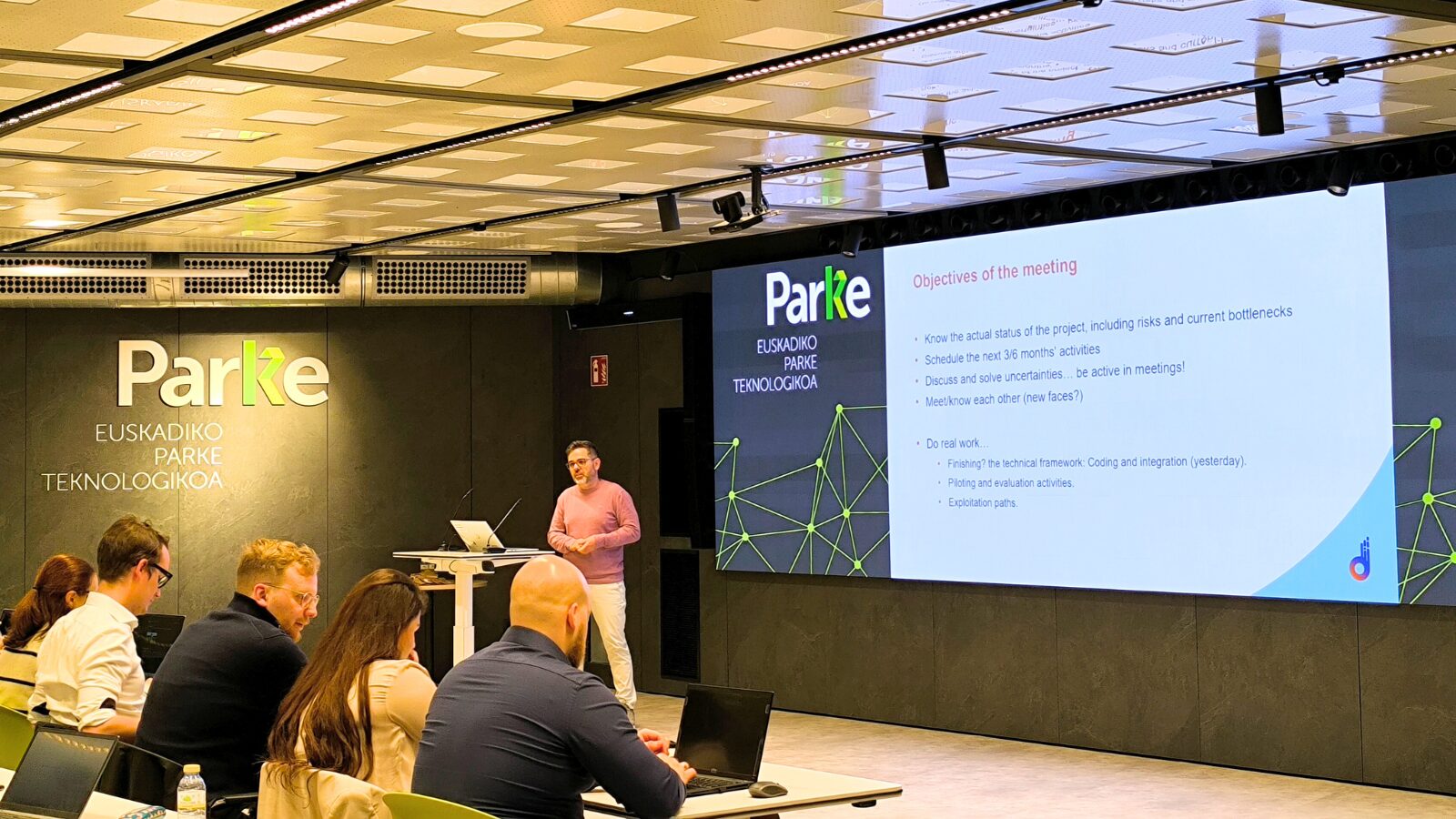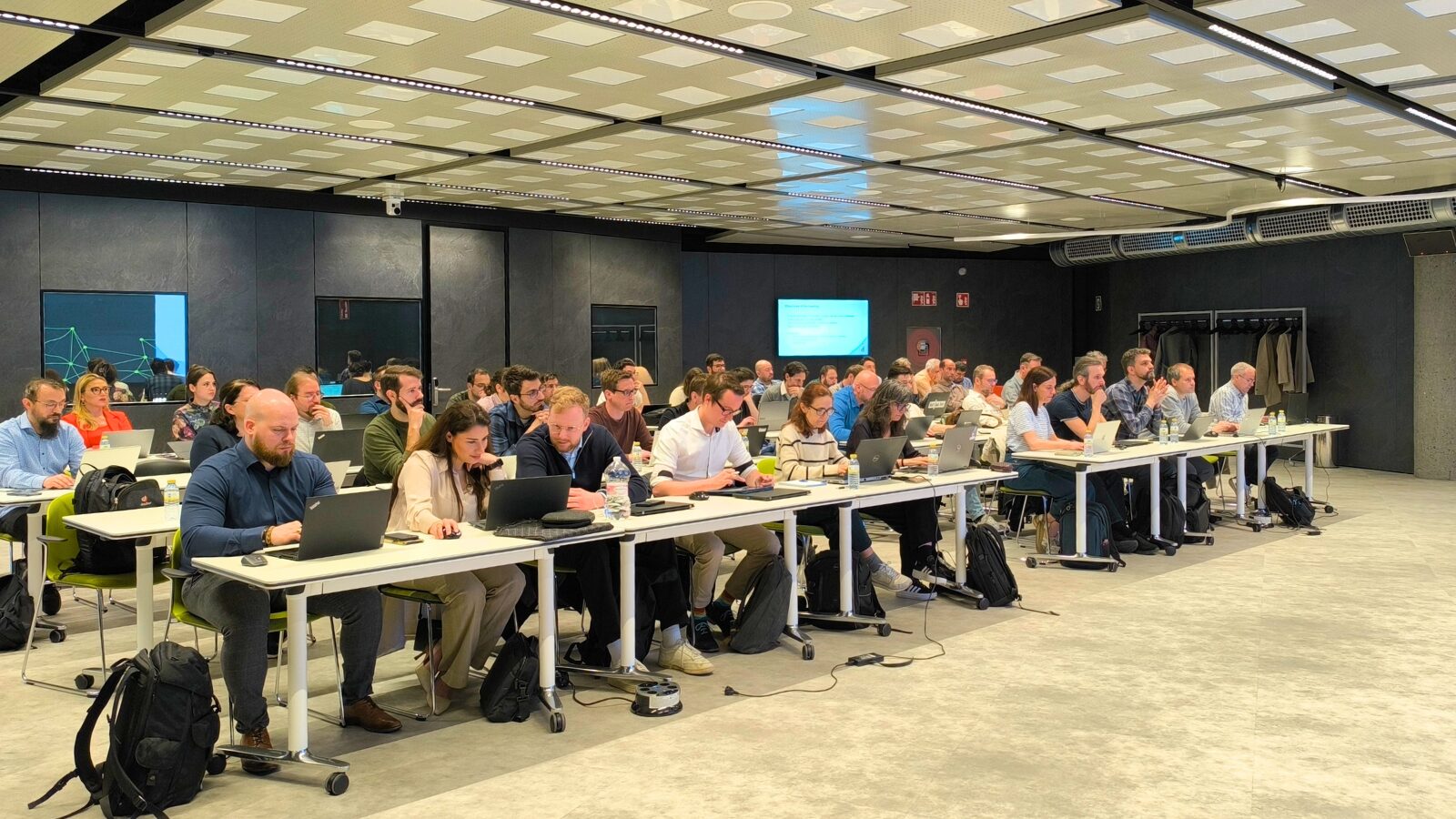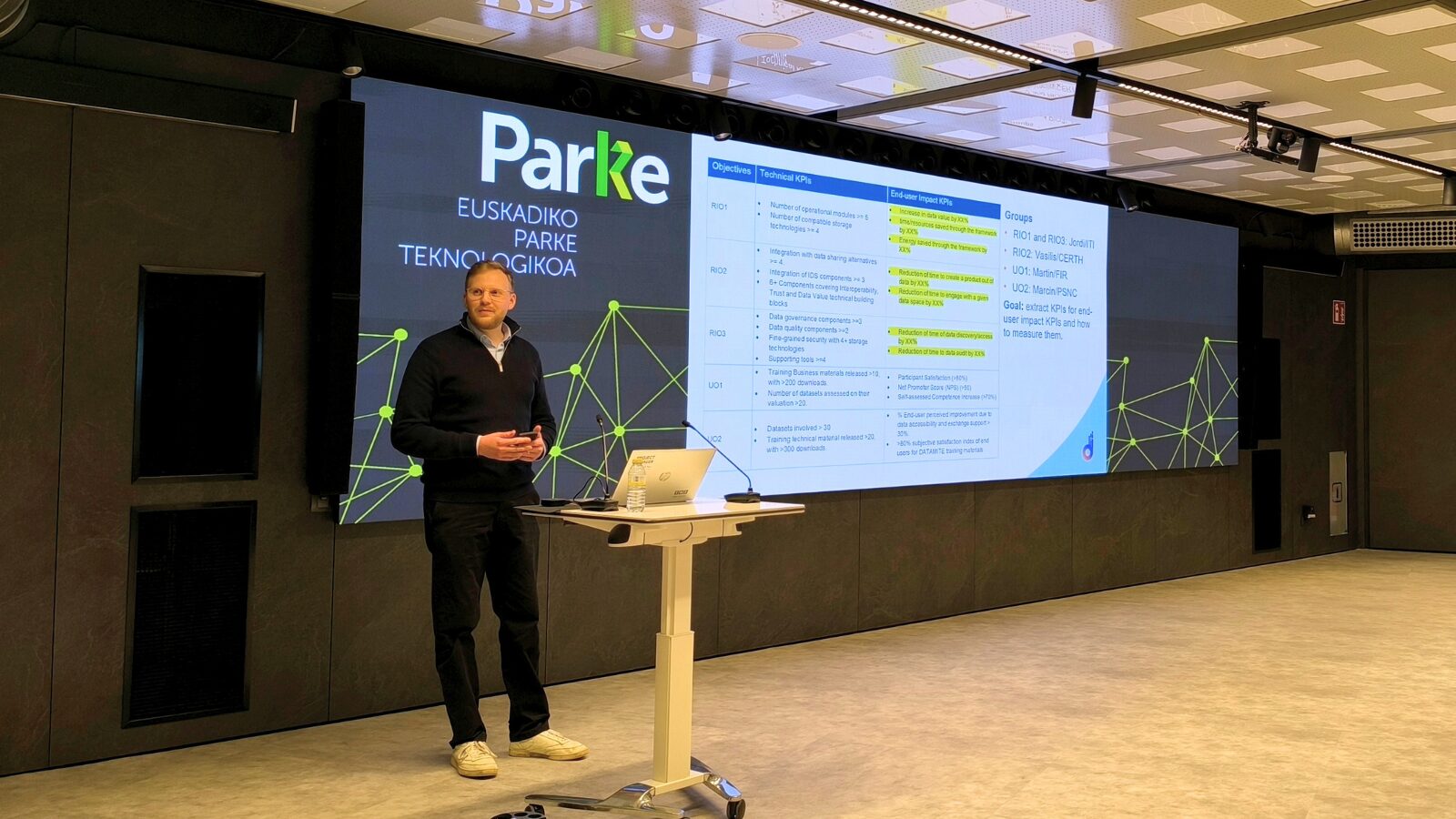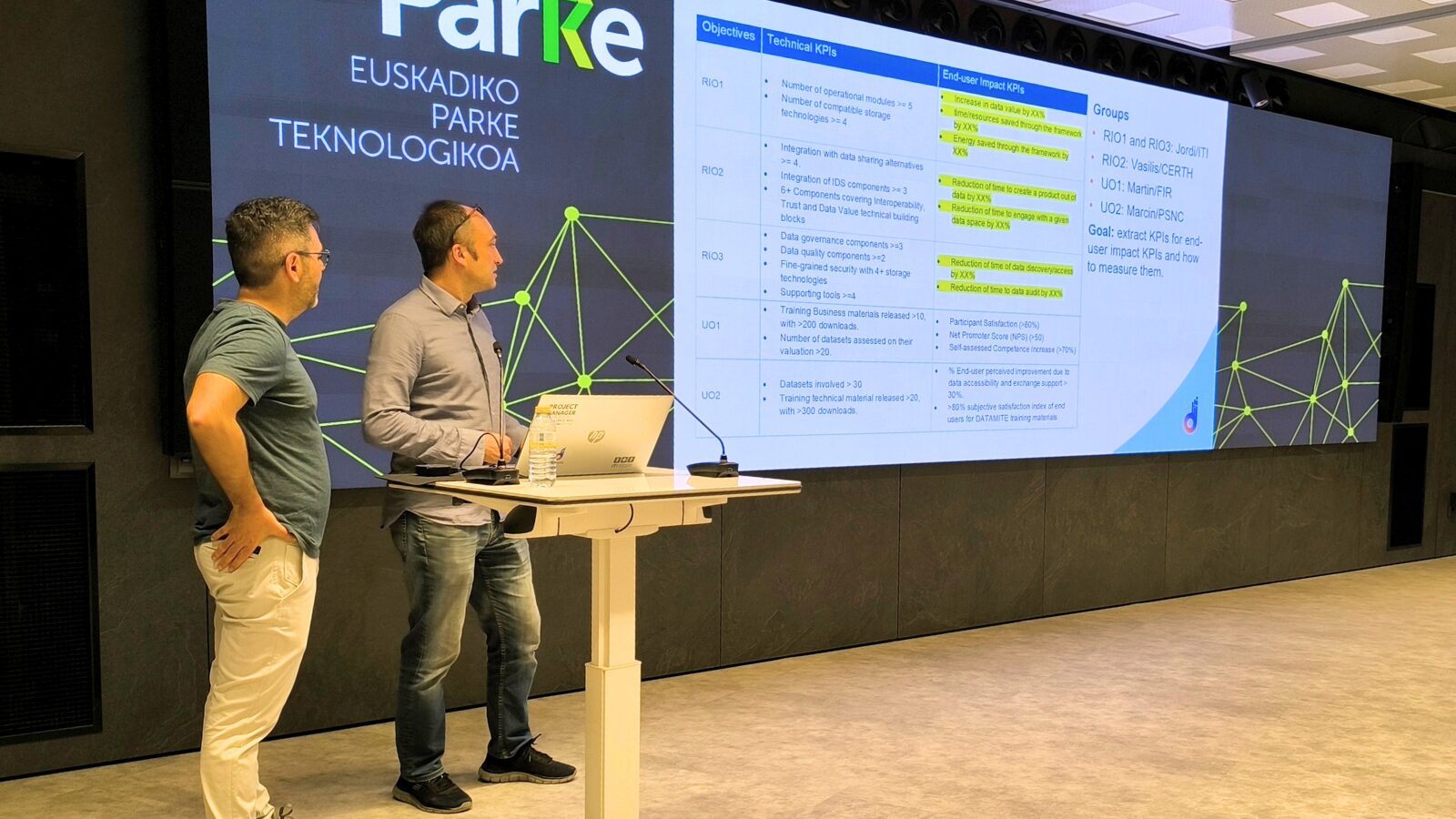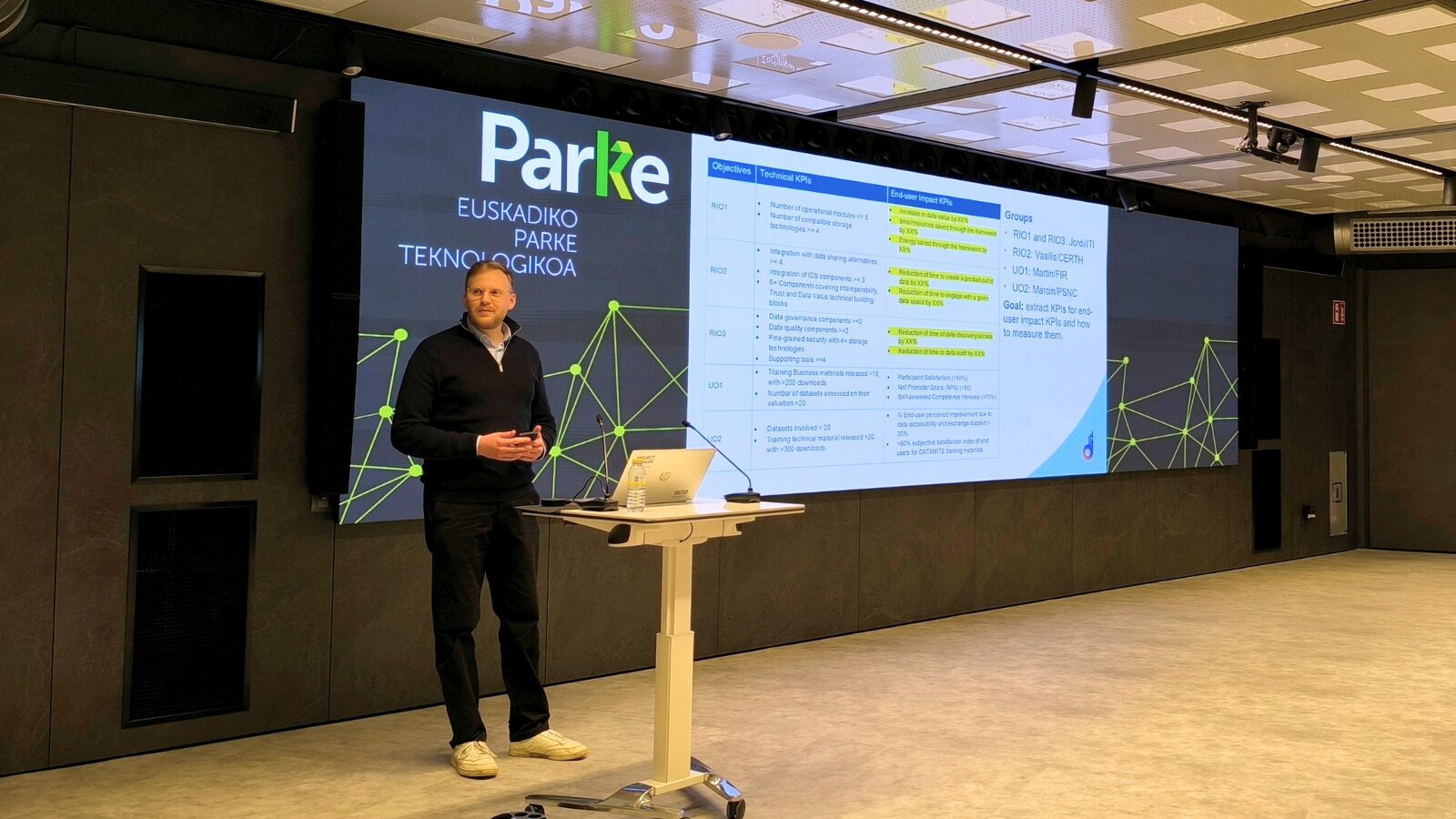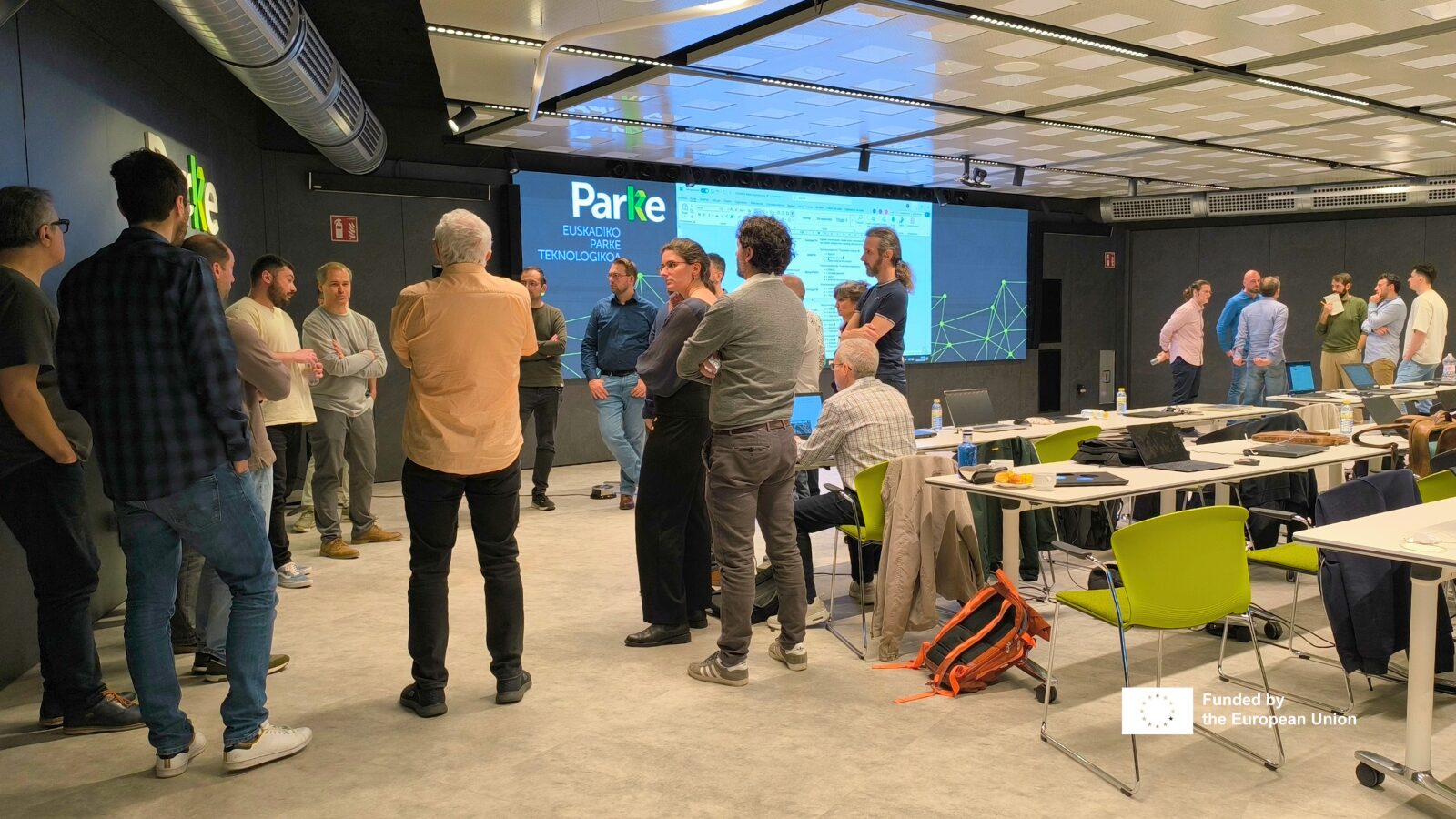DATAMITE presents a paper poster at CIRED 2025
The 2025 CIRED - Conference and Exhibition on Electricity Distribution took place from 16 to 19 June in Geneva, Switzerland. With over 1,600 people attending the conference and 3,000 people visiting the exhibition, CIRED is one of the world’s leading energy conferences. The event featured talks from leading industry figures, roundtable debates, research information forums based on R&D, and guided poster tours.
Ricardo Henriques from E-REDES travelled to Geneva to present a paper poster on DATAMITE at the exhibition. The paper, titled 'Sharing Electricity Distribution Data Through Energy Data Spaces Using the DATAMITE Framework', explores how Distribution System Operators (DSOs) can share electricity distribution data via Energy Data Spaces using the DATAMITE Framework. It does so by examining the use cases implemented by E-REDES in Portugal to enhance its open data portal and test the sharing of data products with external stakeholders, and by HEDNO in Greece to enable data exchange between a DSO and an energy service provider for system planning enhancement.
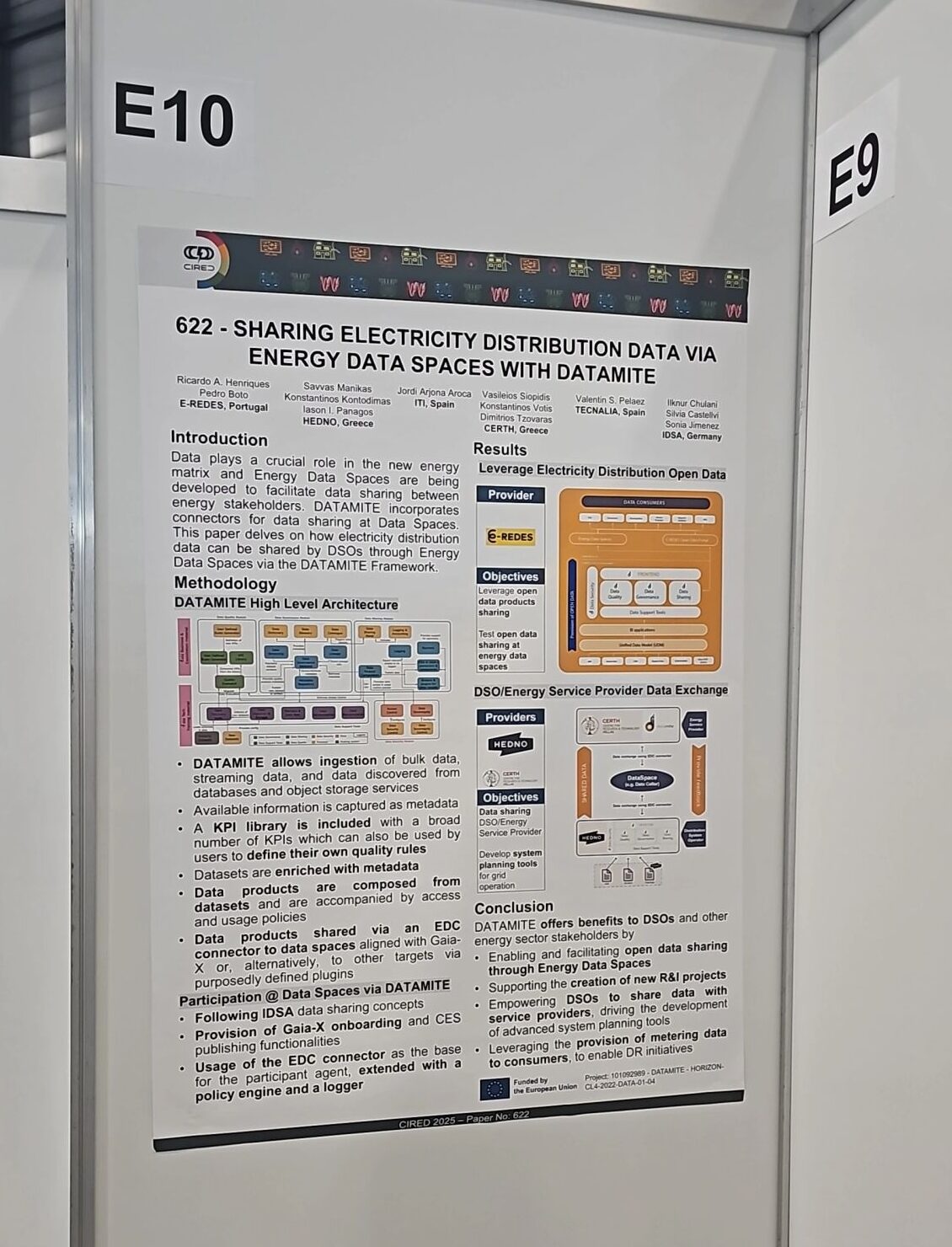
Ricardo Henriques presented the poster paper on behalf of the authors of the paper: himself; Pedro Boto (E-REDES); Savvas Manikas, and Konstantinos Kontodimas (both from HEDNO); Jordi Arjona (ITI); Vasilis Siopidis, Konstantinos Votis and Dimitrios Tzovaras (all from CERTH); Valentín Sánchez (TECNALIA); and Ilknur Çulani, Silvia Castellvi, and Sonia Jiménez (all from the International Data Spaces Association).
If you want to always stay updated about our project, follow us on LinkedIn, Twitter and Bluesky!
DATAMITE at SMARTCOMP 2025
The 2025 IEEE International Conference on Smart Computing (SMARTCOMP) took place from 16 to 19 June in Cork, Ireland. SMARTCOMP is the leading conference in the field of smart computing, which is a multidisciplinary domain based on advances in sensor-based technologies, the Internet of Things, cyber-physical systems, edge computing, big data analytics, machine learning, cognitive computing and artificial intelligence.
This year's conference programme included the 1st International Workshop on Smart AI Models and Data Sharing and Monetisation (SmartAIDa), held 16 June. SmartAIDa aimed to address the growing need for effective frameworks and technologies that enable the sharing, monetisation, and governance of AI models and datasets. As artificial intelligence becomes a cornerstone of innovation across industries, leveraging its full potential requires robust infrastructures, interoperability, and a focus on trust, security, and value creation. Jordi Arjona (ITI), DATAMITE's technical coordinator, was the keynote speaker, and several consortium members presented DATAMITE-related papers.
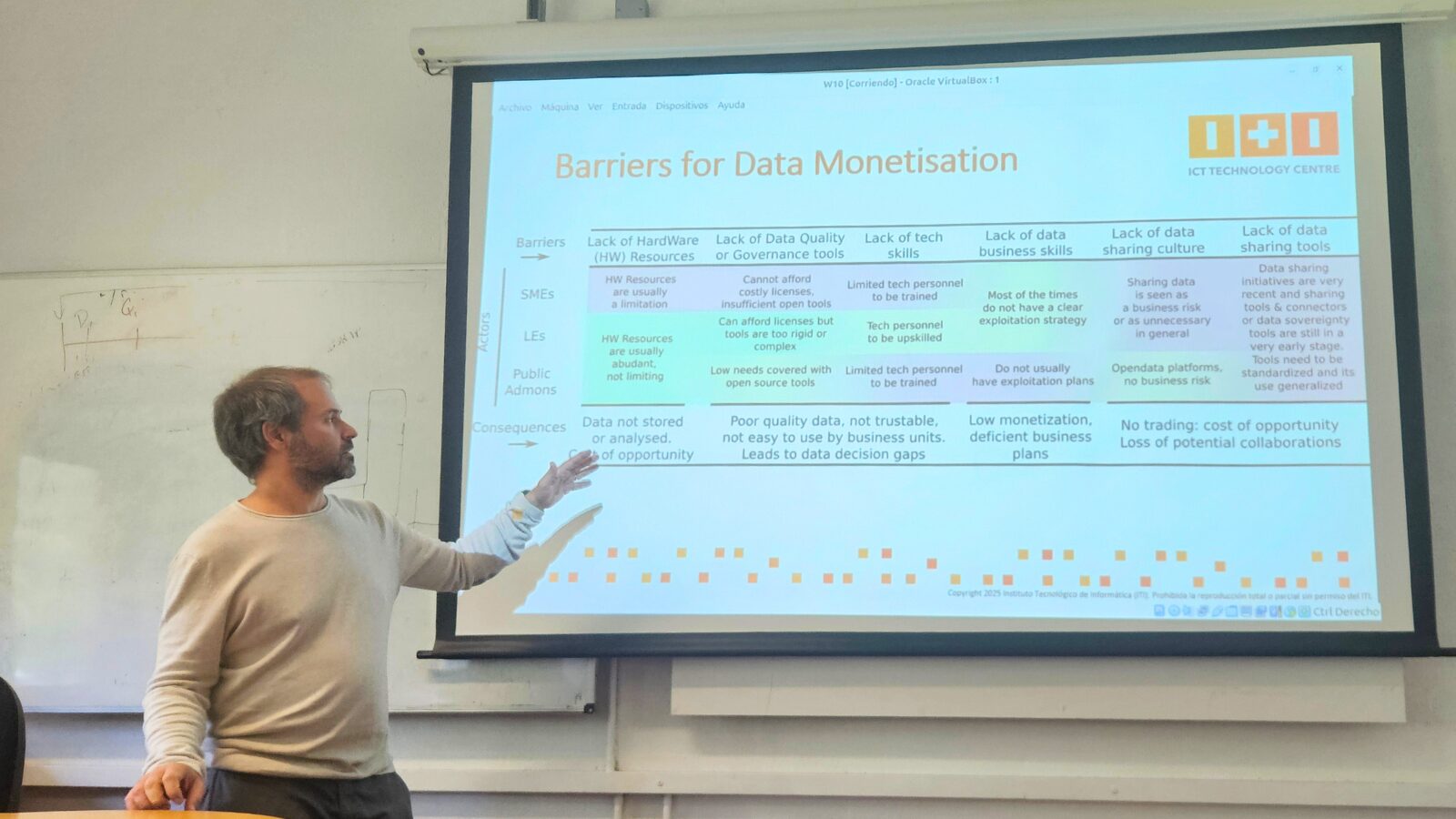
The keynote, entitled 'AI & Data Spaces: The Rise of (Data) Quality', focused on the importance of quality data. Jordi Arjona stated that, with the arrival of Data Spaces and the disruption caused by Generative AI, data quality is once again in the spotlight and will play an even more important role at the intersection of these two worlds. The four DATAMITE-related papers presented at the workshop were:
'Towards a Framework for Intelligent Sampling: Comprehensive Review of Challenges, AI Techniques and Tools', presented by Lander Bonilla (Tecnalia and the University of Deusto), provides an overview of the key challenges associated with traditional data sampling methods. These challenges include class imbalance, overfitting and bias. The paper then explores how AI techniques can solve these problems and improve the sampling process.
'Validating a Strategy Questionnaire for Data Monetization', presented by Martin Loers (FIR and RWTH Aachen University), introduces a questionnaire-based tool designed to help organisations select appropriate data monetisation strategies based on their business models. The tool is built on academic research, industry insights and expert input, and maps responses to one or more of twelve predefined strategies.
'Data Monetization Through Tailored Demand Representation', presented by Eduardo Vyhmeister (Insight Centre for Data Analytics, University College Cork), explores how detailed consumer demand models can support more effective data monetisation strategies. The paper reviews various methods of capturing digital market behaviour, improving upon them by taking elements such as price sensitivity, trust and quality perception into account.
'A Tool for Fairness Assessment and Red‑Lining Detection in AI Systems', presented by Dimitrios Bikoulis (Insight Centre for Data Analytics, University College Cork), introduces a practical framework for evaluating fairness in complex AI systems. The tool brings together advanced fairness metrics and association analysis to reveal hidden biases and proxy variables tied to sensitive attributes, which are key indicators of indirect discrimination or red-lining.
If you want to always stay updated about our project, follow us on LinkedIn, Twitter and Bluesky!
DATAMITE at EGI 2025
The EGI 2025 Conference organised by EGI Foundation was held in Santander, Spain, from2 to 6 June. The conference brought together international scientific communities, IT and service providers, European projects, security experts, community managers, and policy makers to discuss data research and innovation. DATAMITE contributed to the conference by exhibiting a poster showcasing some of the work done during the project and delivering a presentation, as well as displaying a project presentation video.
The poster was pitched during the opening ceremony and presented during the next days by Andrea Cristofori (EGI foundation) on behalf of the project authors (C.H. Brandt, P. E. Kyziropoulos, V. Siopidis, K. Votis, D. Tzovaras, M. González, and A. Cristofori). The poster focuses on the broker modules that publish the data product metadata to EU portals. On all four days of the conference, the DATAMITE poster was on display, with a dedicated afternoon slot for attendees to view it and ask questions to DATAMITE representatives.
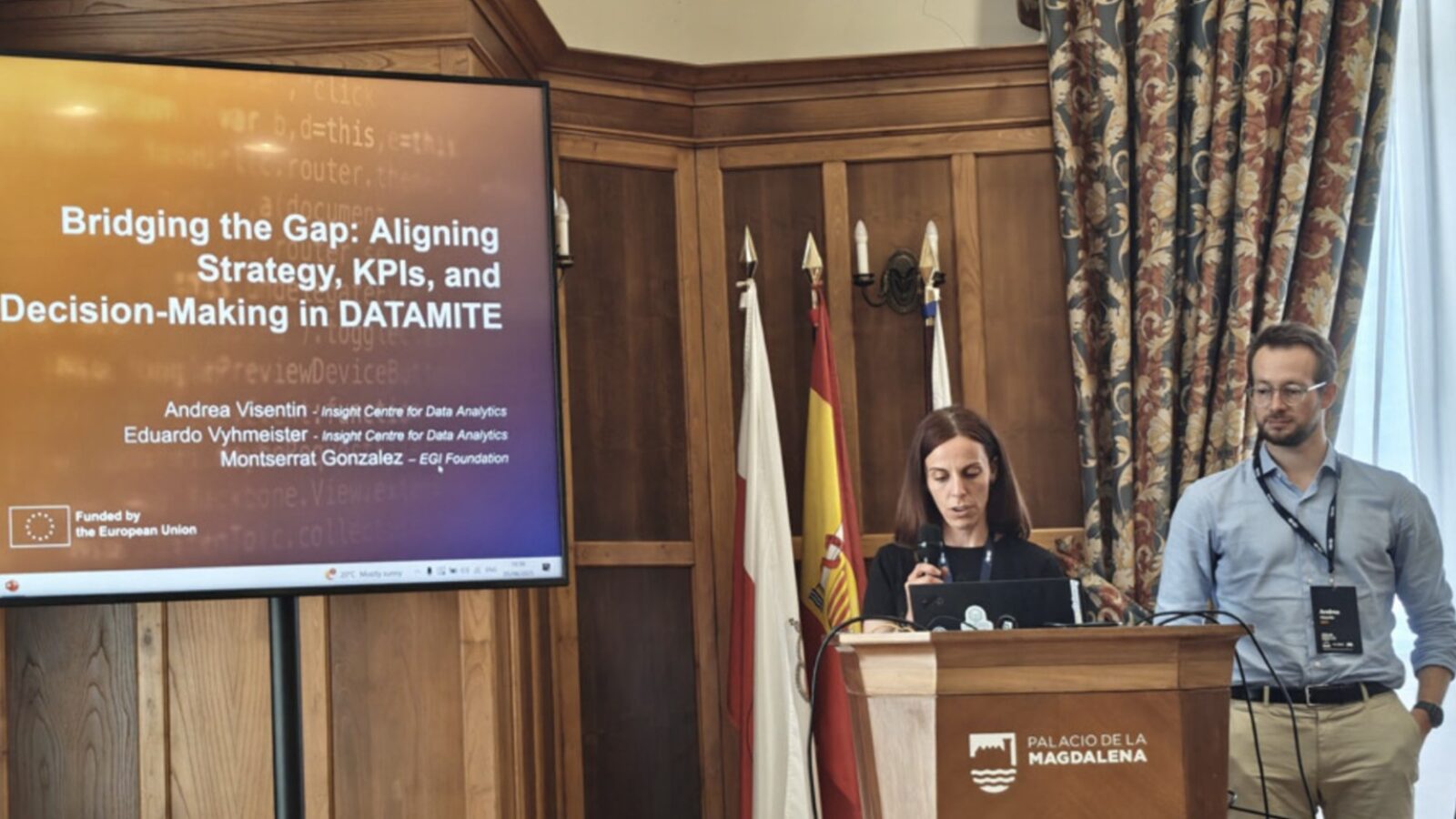
The presentation ‘Bridging the Gap: Aligning Strategy, KPIs, and Decision-Making in DATAMITE’ was prepared by Eduardo Vyhmeister and Andrea Visentin (Insight Centre for Data Analytics, UCC), and Montserrat González (EGI Foundation). The presentation delivered by Andrea and Montserrat explained DATAMITE's work on developing a tool for valuing data based on metrics and KPIs, and the motivations and challenges faced along the way. It also took the opportunity to encourage all attendees to test the tool and provide feedback.
As a partner of the DATAMITE project, the EGI Foundation displayed a video presentation for the DATAMITE project to support its dissemination, communication, and exploitation activities.
If you want to always stay updated about our project, follow us on LinkedIn, Twitter and Bluesky!
DATAMITE's presence at Data Week 2025
Data Week 2025, the spring gathering of Europe's Big Data and Data-Driven AI research and innovation community, took place in Athens, Greece, from 27 to 28 May. With the theme 'Odyssey of AI: Navigating the Data Seas', this year's edition focused on the fundamental elements of data value creation. As usual, DATAMITE was well represented at the event, with a presence in one workshop and as part of the EUDATA+ cluster.
On Tuesday 27, Christos Gizelis from OTE represented DATAMITE at the 'Monetisation & Governance Across Mobility, Media and Trustworthy Data Sharing' session. This session explored methodologies from the DATAMITE project for unlocking the value of data, alongside OTE’s Pluto framework for ensuring robust data governance. Collaboration across trustworthy data sharing (PISTIS), media (FAME), and mobility (MobiSpaces) was highlighted, demonstrating how different sectors are tackling data monetisation and governance while ensuring security, interoperability, and compliance.
On 28 May, the last day of the conference, the EUDATA+ cluster held a session in the plenary room titled 'EUDATA+: Solutions for Data Trading and Marketplaces (Insight for the Future of AI and Data Spaces)'. The session explored ways to advance the state of AI and data spaces in relation to data trading and pricing solutions. It began with an introduction to the cluster's evolution and activities, with a focus on the roles of AI and data spaces in the economics of data.
Two keynote presentations examined technological challenges. Professor George Konstantinidis (University of Southampton) and Dr Martin Serrano (University of Galway, DSI-Insight Centre) discussed the challenges involved in developing AI systems that comply with regulations and respect privacy in federated data environments. This was followed by an overview of EUDATA+'s contributions to the Strategic Research, Innovation and Deployment Agenda. This showcased real-world tools for data valuation and highlighted technological gaps and challenges.
Finally, the session featured a panel of experts who provided specialised insights into relevant topics associated with developments and demonstrations. The panel offered the audience valuable insights into the progress of cutting-edge developments and their involvement in EU Horizon Data Projects. This interactive format enabled a rich exchange of perspectives across scientific, technical, and data-business-oriented domains. Speakers included Daniel Saez representing DATAMITE, who discussed 'Tools for data interoperability in heterogeneous environments'; Fernando Perales representing enRichMyData, who presented 'Automation and data enrichment workflows for developing data businesses'; Yiannis Verginadis representing ExtremeXP, who presented 'NFT-based data provenance for large-scale data experiments'; Nikolas Zafeiropoulos representing FAME, who explained 'Federating assets and commercialising them through data marketplaces'; Radu Prodan, representing Graph-Massivizer, discussed 'Tools for large-scale data processing and analytics prior to market entry'; Sotiris Koussouris, representing PISTIS, discussed 'Enabling data monetisation and trading out of the box'; and George Konstantinidis, representing UPCAST, discussed 'Automating data marketplace operations with user-friendly marketplace plug-ins'.
Data Week 2025 was organised by the Big Data Value Association, hosted by Cosmote – OTE, in collaboration with the following BDVA members: Athens Technology Center S.A. (ATC), Institute of Communication and Computer Systems (ICCS), CORE Innovation Center, Institute of Informatics and Telecommunications – National Centre for Scientific Research “Demokritos”, FORTH and Neuropublic.
If you want to always stay updated about our project, follow us on LinkedIn, Twitter and Bluesky!
DATAMITE from a business point of view
Designed with real market needs in mind, DATAMITE enables companies to unlock the value of their data. It provides tailored monetisation strategies, open-source tools and actionable business models to achieve this. In the 'DATAMITE from a business point of view' video series, we explore how DATAMITE facilitates fair data valuation, generates new business opportunities and establishes a foundation for the sustainable exploitation of data across European industries. To this end, we interviewed four partners responsible for some of DATAMITE's use cases.
Konstantinos Kontodimas and Iason Panagos from HEDNO, a key partner in the development of DATAMITE pilots. From a business perspective, HEDNO demonstrates how the DATAMITE Framework empowers organisations to accelerate their digital transformation and enhances the efficiency and sustainability of electricity distribution networks.
Ricardo Henriques and Pedro Boto from E-REDES, DATAMITE’s partner leading the 'Leveraging Electricity Distribution Open Data' Pilot. From a business perspective, a refined version of the DATAMITE framework could be deployed and managed by E-REDES's DATAHUB to share data with external stakeholders. In addition, data stewards could then be given permissions to create artefacts and data products, define relevant data quality KPIs, and define the entities with which the data should be shared, giving them more autonomy in the process.
Achilleas Marinakis and Christos-Antonios Gizelis from OTE, DATAMITE’s partner leading the 'Corporate Multi-Site Data Exchange' pilot. From a business perspective, OTE shows how the DATAMITE Framework can create new opportunities for data-driven innovation and improve operational efficiency in the energy sector.
Federico Piñuela García from Grupo Gimeno, DATAMITE’s partner leading the 'Corporate Multi-Domain Data Exchange with DIH Support' pilot. From a business perspective, Grupo Gimeno uses the advanced data-sharing and analytics capabilities of the DATAMITE framework to optimise processes and unlock new business.
If you want to always stay updated about our project, follow us on LinkedIn, Twitter and Bluesky!
Why is it important to have a legal partner in a data project?
At DATAMITE, our goal is to encompass every facet of data exchange and monetisation. To this end, our consortium includes partners that extend beyond the technological and monetary fields, such as the Law and Internet Foundation (LIF). LIF is responsible for providing thorough insights into the EU legal framework for data transfers, with a particular focus on the Regulation on the Free Flow of Non-Personal Data in the European Union and the General Data Protection Regulation (GDPR).
To illustrate the importance of having a legal partner on a project like DATAMITE, we interviewed Polina Petrova and Daniela Ilieva from LIF. They explained how their work enables the formulation of tailored legal and ethical requirements specific to the technical components of DATAMITE, ensuring their compliance with relevant legal and ethical requirements.
Watch the video here and below.
DATAMITE Plenary Meeting in Bilbao
From 8 to 10 April, the DATAMITE consortium held its first plenary meeting of 2025 in Bilbao, Spain. This important meeting was held to discuss the steps needed to achieve the project's goal before DATAMITE ends, presumably by the end of the year. As at the previous plenary meeting in Aachen, the agenda included a CodeCamp day with the project's developers on the first day, followed by two days with the entire consortium. Each work package presented its progress and future steps.
The first day was spent at CodeCamp. This edition focused on coding and component integration. Participants were split into groups and worked on specific tasks related to Work Packages 2 (Data Sharing Mechanisms and Data Sovereignty) and 3 (Data Governance, Quality, Security and Support Modules). Through collaborative sessions and structured objectives, the teams made significant progress in developing and integrating these components. This culminated in a joint wrap-up session, during which the teams presented their achievements and planned their next steps.
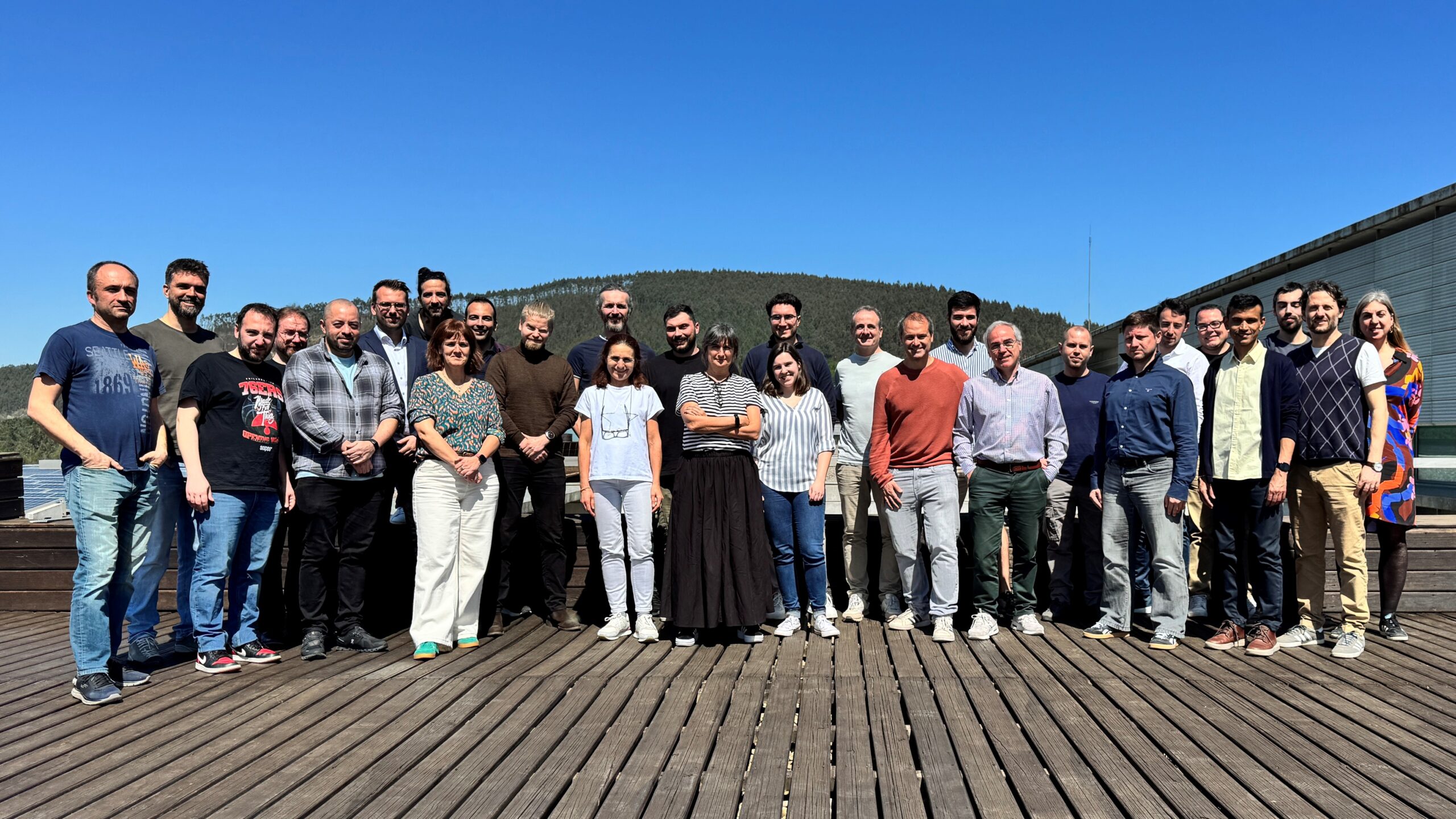
The remaining partners who were not involved in the CodeCamp joined on 9 and 10 April. The two-day plenary meeting focused on reviewing progress and aligning the next steps for all work packages. On the first day, the project coordinator (ITI) began with updates, outlining the project's current status, future deliverables, and important recommendations. Sessions covered essential topics such as data asset sizing, KPI development, legal applicability, energy consumption. Each topic was discussed through concise, action-oriented presentations.
One of the day's highlights was the interactive 'Gender Bias' session, which was led by Margit Hofer from ZSI. She illustrated how poor data quality affects not only a company's revenues, but also society, resulting in biases in AI models relating to race and gender. Approaching the topic from a dynamic, brainstorming perspective as a project was very instructive and inspiring.
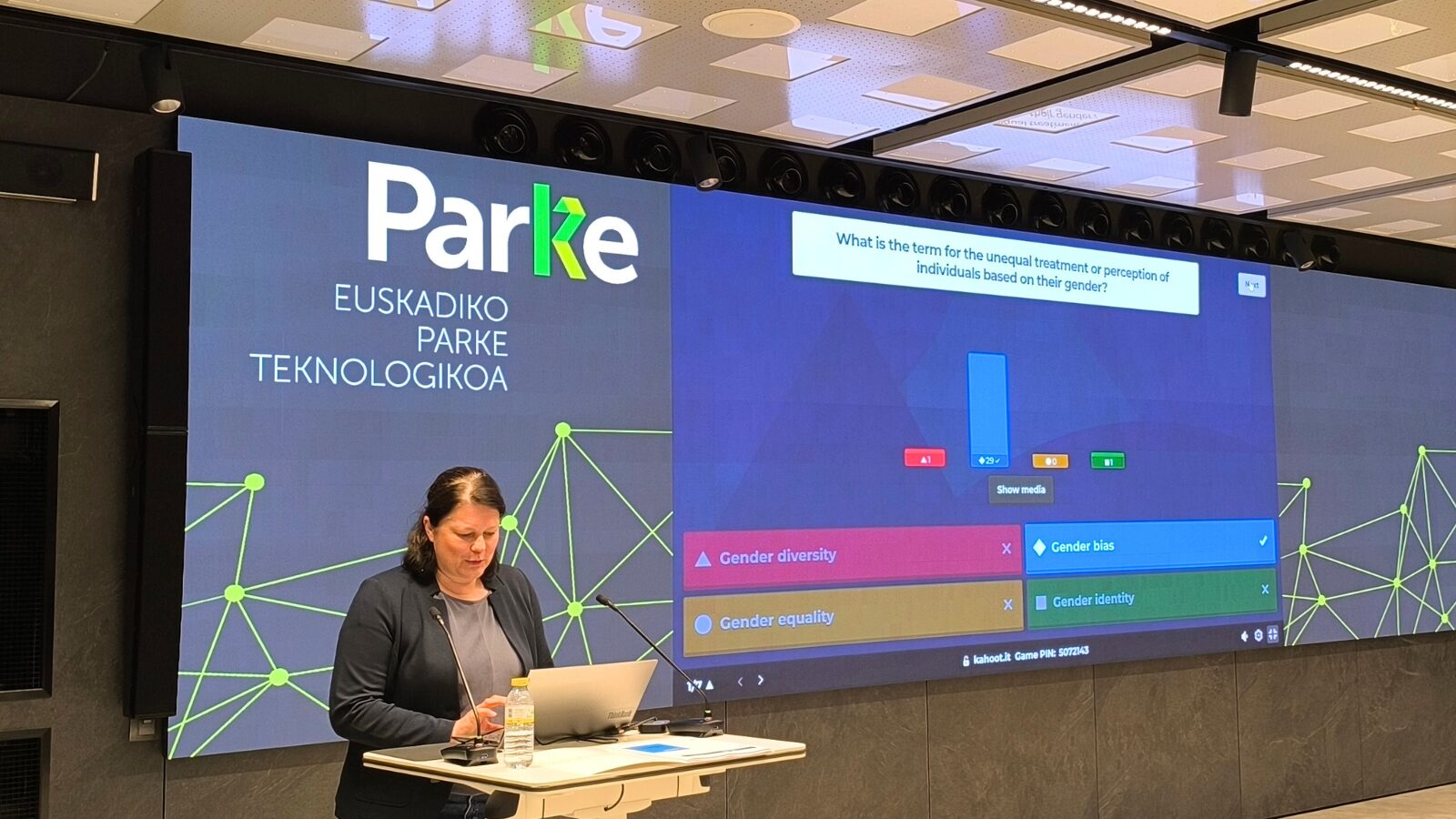
In the afternoon, Pilots 5 and 6 were spotlighted to demonstrate progress on real-world integration. This was followed by an in-depth exploration of open-source business models and Eclipse ecosystem opportunities.
The second day covered the remaining pilot updates (Pilots 1–4), communications KPIs, the intellectual property strategy, and the Data Monetisation Maturity Model. The meeting concluded with a discussion about future training materials, preparing the consortium for the next implementation phase.
In addition to three days of intensive work, the DATAMITE consortium enjoyed a visit to the Guggenheim Museum, followed by a traditional Basque dinner in the centre of Bilbao. Many thanks to our colleagues at Tecnalia for hosting the plenary meeting.
If you want to always stay updated about our project, follow us on LinkedIn, Twitter and Bluesky!
DATAMITE at the Data Spaces Symposium
The Data Spaces Symposium took place on 11-12 March in Warsaw, Poland. Hosted by the Data Spaces Support Centre and the Data Spaces Business Alliance, it is the premier global event dedicated to the future of data spaces, bringing together the brightest minds, leading innovators and pioneering organisations to shape a connected, data-driven world. The 2025 edition was also embedded in the Polish ICT Week. This made the event the perfect platform to showcase the latest market-ready use cases and advanced technology solutions for existing and emerging data spaces.
As in previous editions, DATAMITE did not want to miss out on this important event in the world of the European data economy and the development of European data spaces, two of the fundamental pillars of the project. While last year DATAMITE participated as part of the EUDATA+ cluster in one of the parallel sessions of Data Week, this year DATAMITE, through several of its consortium members, participated in the Data Spaces Symposium with several sessions and a booth.

Daniel Saez Domingo from ITI, the institution that coordinates DATAMITE, took part in the 'Mobility & tourism: Creating value for participants in mobility and tourism data spaces' session. During his presentation, he explained how the DATAMITE platform helps SMEs to extract the most appropriate data from data spaces for their needs, while maintaining the highest quality and reliability of data, thus improving their data monetisation. This session was moderated by Mariano Blaya Andreu from the International Data Spaces Association, a member of the DATAMITE Consortium.

During the 'Agriculture track: Towards development of the agriculture data spaces', DATAMITE had a triple representation. Marcin Płóciennik from Poznan Supercomputing and Networking Center (PSNC) led the track and gave the presentation 'Digital framework supporting data monetization for agricultural data space', which mainly focused on showing their use case in DATAMITE as an example of how data spaces can improve the agricultural sector's needs for better data use and data monetisation. Another PSNC member, Raul Palma, took part in the agricultural session too. Finally, the agriculture track closed with a panel discussion in which Marcin Płóciennik and Raul Palma were joined by Marko Turpeinen, CEO at 1001 Lakes, a member of the DATAMITE consortium, which focuses on the development of DATAMITE monetisation strategies.
In addition, during the two days of the conference, PSNC had an exhibition stand to showcase the results of EU-funded projects in which it is involved. One of these projects is DATAMITE.
If you want to always stay updated about our project, follow us on LinkedIn, Twitter and Bluesky!
DATAMITE Meet Up event
On 6 February, the DATAMITE project hosted the DATAMITE Meet Up event at the OTE headquarters in Athens, Greece, under the theme 'Bridging Research and Industry in EU-funded Innovation'.
Bringing together Europe's leading innovators, researchers, policy makers and industry leaders to foster collaboration, accelerate data-driven progress and create a unified strategy for Europe's digital future, the event was a unique networking opportunity bringing together researchers and industry professionals involved in EU-funded projects.
The day was divided into five panel discussions where participants explored cutting-edge research, shared insights and discussed needs, concerns and solutions in critical areas such as data ethics, privacy, cybersecurity, AI, IoT and sustainable innovation. The event was livestreamed. If you missed it, you can watch it on our YouTube channel. Do not miss it!
The five panels were:
- Creating Value in Data Marketplaces: The role of Data Spaces. Opportunities & Risks: Explore the growing popularity of data marketplaces, where organisations buy and sell data, and the potential value and risks involved.
- Data Exploitation in the Health Sector: How healthcare organisations can benefit or even generate revenue from data assets, including best practices, risks and innovative business models.
- Data Monetization Strategies & the Value of Data as an Asset: How organisations can generate revenue from data assets, including best practices, risks and innovative business models.
- Data-Driven Transformation Across Industries: Lessons and Innovations in Key Sectors: How data is transforming specific industries such as healthcare, finance, retail, manufacturing and transportation, highlighting sector-specific challenges, innovations and best practices in using data to drive growth and efficiency.
- Privacy and Security in the Age of Data – Finding a Balance through Legal and Ethical Challenges: Deep dive into the inherent tension between data monetisation and user privacy, focusing on ways to balance revenue generation with respect for user rights.
Throughout the event, a team of photographers worked to capture all the moments that made the DATAMITE Meet Up event such a special day. All the photos can be viewed here.
If you want to always stay updated about our project, follow us on LinkedIn, Twitter and Bluesky!
Save the date: DATAMITE Meet Up event
The DATAMITE project is thrilled to invite you to the DATAMITE Meetup event - a unique networking opportunity bringing together researchers and industry professionals involved in EU-funded projects.
The DATAMITE Project Meetup, hosted by OTE's IT Innovation Center under the theme 'Bridging Research and Industry in EU-funded Innovation', will bring together Europe's top innovators, researchers, policy makers, and industry leaders to foster collaboration, accelerate data-driven progress and create a unified strategy for Europe's digital future.
Key information
- When: 6 February, 2025, at 9:00 Local time.
- Where: OTE HQs, Athens, Greece
The day will be divided into five panel discussions where participants will explore cutting-edge research, share insights and discuss needs, concerns and solutions in critical areas such as data ethics, privacy, cybersecurity, AI, IoT and sustainable innovation.
The five panels are:
- Creating Value in Data Marketplaces: The role of Data Spaces. Opportunities & Risks: Explore the growing popularity of data marketplaces, where organisations buy and sell data, and the potential value and risks involved.
- Data Exploitation in the Health Sector: How healthcare organisations can benefit or even generate revenue from data assets, including best practices, risks and innovative business models.
- Data Monetization Strategies & the Value of Data as an Asset: How organisations can generate revenue from data assets, including best practices, risks and innovative business models.
- Data-Driven Transformation Across Industries: Lessons and Innovations in Key Sectors: How data is transforming specific industries such as healthcare, finance, retail, manufacturing and transportation, highlighting sector-specific challenges, innovations and best practices in using data to drive growth and efficiency.
- Privacy and Security in the Age of Data – Finding a Balance through Legal and Ethical Challenges: Deep dive into the inherent tension between data monetisation and user privacy, focusing on ways to balance revenue generation with respect for user rights.
Watch the live stream recording here.
If you want to always stay updated about our project, follow us on LinkedIn, Twitter and Bluesky!


